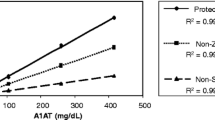Abstract
The diagnosis of alpha-1-antitrypsin (A1AT) deficiency is established by quantitation of protein concentration in serum (immunoassay) followed by determination of specific allelic variants by phenotyping (isoelectric focusing (IEF) gel electrophoresis) and/or allele-specific genotyping. Various phenotyping and genotyping methodologies are available, and each has their own advantages and disadvantages. As an alternative, mass spectrometry is emerging as a powerful tool in the identification and quantitation of proteins and peptides. The method described here, referred to as proteotyping, is a proteomic method using trypsin digestion and tandem mass spectrometry that detects the most common deficiency alleles, S and Z, associated with A1AT deficiency.
This qualitative mass spectrometry method is based on the principle that the S and Z mutations lead to amino acid changes which result in a change in the mass of the A1AT protein. When the A1AT protein is proteolytically digested, multiple peptides are generated, two of which include the sites of the S and Z mutations, respectively. Peptides generated from wild-type A1AT (M alleles) differ in sequence and mass from peptides generated from the S and Z alleles at these two specific locations. The mass difference allows for differentiation of S and Z peptides, representing the deficiency alleles, from non-S and non-Z peptides, representing the wild-type alleles (M). Interpretation of the peptide patterns in conjunction with A1AT quantitation by immunoassay allows for an accurate assessment for the presence of deficiency alleles in the majority of patients.
Access this chapter
Tax calculation will be finalised at checkout
Purchases are for personal use only
Similar content being viewed by others
References
Seixas S, Marques PI (2021) Known mutations as the cause of alpha-1 antitrypsin deficiency an updated overview of SERPINA1 variation spectrum. Appl Clin Genet 14:173–184
Foil KE (2021) Variants of SERPINA1 and the increasing complexity of testing for alpha-1 antitrypsin deficiency. Ther Adv Chronic Dis 12:33–48
Chapman KR (2020) Bench to bedside and back: the evolving story of alpha-1 antitrypsin deficiency. Am J Respir Cell Mol Biol 63:403–404
Brantly M, Campos M, Davis AM et al (2020) Detection of alpha-1 antitrypsin deficiency: the past, present and future. Orphanet J Rare Dis 15:96
Jannetto PJ, Fitzgerald RI (2016) Effective use of mass spectrometry in the clinical laboratory. Clin Chem 62:92–98
Scherl A (2015) Clinical protein mass spectrometry. Methods 81:3–14
Forgrave LM, Wang M, Yang D et al (2022) Proteoforms and their expanding role in laboratory medicine. Pract Lab Med 28:e00260
Chen Y, Snyder MR, Zhu Y et al (2011) Simultaneous phenotyping and quantification of α-1-antitrypsin by liquid chromatography-tandem mass spectrometry. Clin Chem 57:1161–1168
Donato LJ, Karras RM, Katzmann JA et al (2015) Quantitation of circulating wild-type alpha-1-antitrypsin in heterozygous carriers of the S and Z deficiency alleles. Respir Res 16:96
Murray JD, Willrich MA, Krowka MJ et al (2021) Liquid chromatography-tandem mass spectrometry based alpha1-antitrypsin (AAT) testing. Am J Clin Pathol 155:547–552
Donato LJ, Jenkins SM, Smith C et al (2012) Reference and interpretive ranges for alpha(1)-antitrypsin quantitation by phenotype in adult and pediatric populations. Am J Clin Pathol 138:398–405
Suh-Lailam BB, Procter M, Krauscheid P et al (2014) Challenging identification of a novel PiISF and the rare PiMmaltonZ alpha1-antitrypsin deficiency variants in two patients. Am J Clin Pathol 141:742–746
Ringenbach MR, Banta E, Snyder MR et al (2011) A challenging diagnosis of alpha-1-antitrypsin deficiency: identification of a patient with a novel Fnull phenotype. Allergy Asthma Clin Immunol 7:18
Author information
Authors and Affiliations
Corresponding author
Editor information
Editors and Affiliations
Rights and permissions
Copyright information
© 2024 The Author(s), under exclusive license to Springer Science+Business Media, LLC, part of Springer Nature
About this protocol
Cite this protocol
Kemp, J., Ladwig, P.M., Snyder, M.R. (2024). Alpha-1-Antitrypsin (A1AT) Proteotyping by LC-MS/MS. In: Bristow, C.L. (eds) Alpha-1 Antitrypsin. Methods in Molecular Biology, vol 2750. Humana, New York, NY. https://doi.org/10.1007/978-1-0716-3605-3_9
Download citation
DOI: https://doi.org/10.1007/978-1-0716-3605-3_9
Published:
Publisher Name: Humana, New York, NY
Print ISBN: 978-1-0716-3604-6
Online ISBN: 978-1-0716-3605-3
eBook Packages: Springer Protocols




